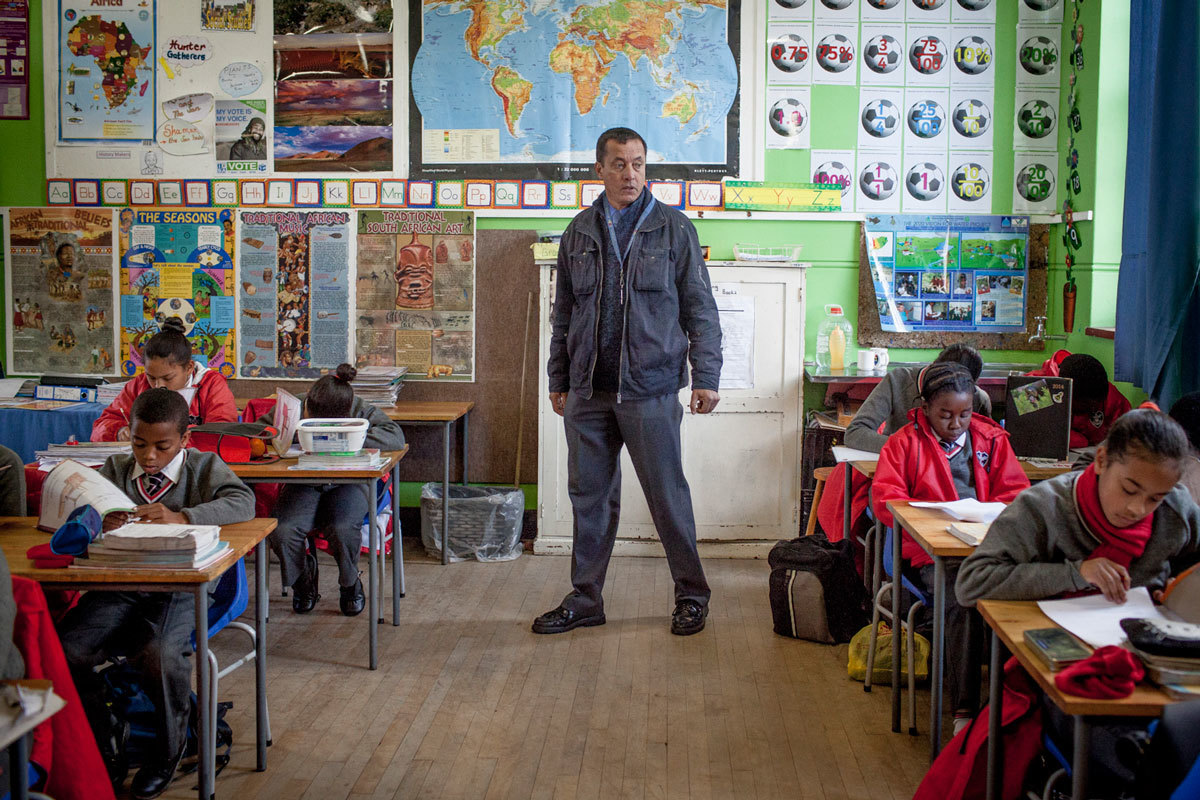Alfonso Louw sometimes tells a wry joke when introducing himself. “Hello, I’m a primary school principal,” he says. “What kind of superhero are you?” The humour is self-deprecating; it refers to the multiple roles he is required to play. A youthful 55-year-old (“I think I have the sexiest man on earth,” his wife says), Alfonso sits in a computerless office, surrounded by administrative files. A rosary dangles from the wall, which sports a plethora of intricate timetables and a showcase of messages from pupils past and present. “Thank you for how you have encouraged me this past seven years,” one reads. Another, from a 32-year-old alumnus who is now a doctor, says “I was awkward & nerdy and you always treated me with such dignity and respect.”
The day before, by 11am, Alfonso had taught a class, attended assembly, prepared for an Institutional Management and Governance (IMG) visit and an evening Governing Body meeting, begun collections for a raffle, checked in on a Grade 3 class that wanted to show him how they had grasped their two times table, and investigated quorums for a high school governing body by-election he had volunteered to chair. This morning, he has dealt with an email system on the blink, a tea urn that was left on (the element can burn out, it’s happened before), plus briefed a handyman on leaks that have sprung in the winter rain. Exams are looming and assessment tests are underway. He’s also gathered Grades 4 to 7 in the school hall for a LeadSA event (they’re 15 minutes late, enough to play havoc with the intricate school timetable). Alfonso is as agitated as I ever see him, and even now he’s full of humour. “When my IMG came in yesterday he said to me, Alfonso, dit lyk as of jy besig is [it looks like you’re busy]. Really? You don’t say.”
The “hip” Woodstock that gets media attention is clustered along just a few main streets, but says Alfonso, “Go up a side street and you’ll find this contrast between these posh restaurants and extreme poverty.”
St Agnes Primary School, the centre of Alfonso’s working life, is tucked off one-way Dublin Road in Woodstock, a dilapidated block that falls between Albert and Victoria roads. The school has the arched corridors and voluminous spaces of times gone by, steeped in chalk dust and repetition. It was opened by the Dominican Sisters in 1899, with a further building added by the Christian Brothers in 1936. Today there are 381 children—but with plans to grow. The same can’t be said for the sisters. In 1970, there were still seven, but pupil numbers were dropping. A school history attributes the decline to the Group Areas Act of 1950, smaller families, and the development of Bothasig—named after then Minister of Community Development PW Botha—into “little Woodstock”. In 1994, Sister Justina, the last Dominican Sister, stepped down as headmistress and St Agnes became a public school on private land. Despite being government run, it has permission to retain its Catholic ethos: statues of the Virgin Mary and other saints stand pastel calm on corridors.
The school is co-educational. Fees are R275 per month for 11 months for Grades 1-7 and there is an extra annual R280 “resource levy”. St Agnes is slap-bang in the centre of a working-class suburb full of poverty and new migrants to the city; it is also gentrifying around the edges. Historical photographs show football and cricket teams from the 1940s. The strapping children’s surnames suggest homogenous European roots: Hay, Derby-Lewis, Smith, Tyldesley, Hawkins; the odd Fiorentinoes. Now, like many former Model C schools (and particularly non-elite English schools in accessible areas), the demographics have flick-flacked. Up to 50% of the children in the foundation phase classes (Grades 1 to 3) are not English mother-tongue language speakers. Many students live nearby, in Woodstock, a suburb with mixed demographics: 50% coloured, 25% black, 14% white. Others travel in from the townships, sent by their parents in search of that luminous chance of a better start in life. Khayelitsha mom Nosisa Ndlebe, fresh from picking up her child’s report, says that despite the cost and extra two hours travel time a day, “I’m trying by all means to give [my daughter] a better foundation”. As Crain Soudien, a sociology professor and vice-chancellor at the University of Cape Town, puts it in his book Realising the Dream (2012), while the family “remains the central space for shaping a child’s values, the realisations of the range of potentials a child has is pre-eminently the terrain of interest of the school”. And many parents believe this potential will be best realised through an English education.


